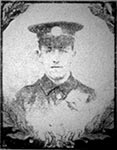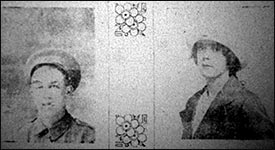The Rushden Echo, 24th December 1915, transcribed by Gill Hollis
Rushden Soldier At Home - “What Ho!” With “Lloyd George Specials”
An Interesting Romance - Private Sydney Austin of the 1st Bedfordshire Regiment
Pte. William Austin Wounded and Gassed
“If You Want a Feed, Surrender”
Private Sydney Austin (Rushden), of the 1st Battalion Beds Regt., is home on ten days’ leave after having been on active service on the western front for about 12 months. Interviewed by a representative of the “Rushden Echo” he said:-
“So far as my general health is concerned I am pretty fit, but get occasional twinges of rheumatism owing to the awful wet weather we have had. It is quite impossible to get through the communication trenches, as they are three or four feet in mud. Owing to the severe rains, and the shaking of the ground through the explosion of mines, nearly all the dug-outs have fallen in, so there is practically no shelter for us until we get back to billets. Since last July things have been pretty quiet except for bomb attacks. About a fortnight ago we delivered a big bomb attack against the German trenches with the object of finding out the strength of the German positions. They must have expected us, as we found them well prepared.
“Although there was no rifle fire an officer and three parties of the Dorset Regt., were wounded by the explosion of one of the enemy’s bombs. As the bombing parties commenced their work, our artillery opened fire on the German reserve trenches to hold them in check. They gave them ‘What ho’ with ‘Lloyd George specials,’ which are the best shells we have had out there so far. We also gave them several whiz-bangs, and these missiles must have been getting amongst them proper, as we could hear them yelling and groaning.
“Several of the enemy have given themselves up to a regiment on our left, and our officer has stuck up a board about ten yards from the German trenches telling them if they want a feed to come across to us, as apparently most of the enemy have been told that the British kill all the prisoners they take, and for that reason they are afraid to give themselves up.
“I took part in the Battle of Hill 60, and that was one of the worst experiences I have had since I have been out there. For seven or eight hours it was like being in hell, as men of both sides were blown into the air by the explosion of mines. At the same time the artillery, both German and British, was kicking up a deafening roar that very nearly burst our ear drums.
“It didn’t fall to our lot to take part in the bayonet charge when the hill was captured, as this was accomplished by the West Kents in a fine rush. In the actual assault they did not lose a man, but later on they, with other regiments, including mine, that were ordered to hold the summit, suffered many casualties as the German artillery made a special mark of this position we had taken from them.
“Also the German first line of trenches was only about forty yards from the top of the hill, and the enemy threw over a good many bombs. During this engagement the King’s Own Scottish Borderers did some very fine work. With my own eyes I saw one Scotchman, with his jacket and hat off, standing on our parapet throwing bombs into the German trenches as hard as he could. He was there for some long time and seemed to take no notice of any danger. I was busy fetching ammunition and stretchers throughout the battle.
“About three weeks after this my regiment was subject to a gas attach by the Germans, and so awful were the fumes, taking into consideration that we had no protection except damp body belts to put around our faces, it is not surprising that we could not hold our ground. The Germans succeeded in getting half-way through the trench, but no further. Three hundred men were sent to reinforce us, and succeeded in reaching the trench, but were then overcome by the gas. It was not until we were relieved that the captured portion of the trench was retaken.
“General French gave my brigade a special word of praise for the good work they had done. As a result of the gas I swallowed on that occasion I was in hospital a week.
“The effect of the gas is horrible. It produces a choking sensation, and your throat feels as if it is on fire. Fortunately I only got a weak dose, which, however, was sufficient to prevent me from eating. I was able to walk about, however.
“At the time of this gas attack the fellows who had got it badly were shrieking for water, but it was very difficult to obtain as the Germans knew where we were getting the water from, and kept shelling the position.
“At that point we were in the trenches and in reserve for 53 days before we got relieved. Since then we have had a ‘cushy’ time, as we are now stationed at a very quiet part of the line, and can get hot meals and hot tea in the trenches.
“Matters in the way of feeding Tommy at the front have not always been as they should be, in my opinion, but lately conditions have improved. We are getting our rum more regularly now than last winter as it is served out on a different system. Several times last winter when we wanted it badly we didn’t get it. We now get two tablespoons full every night.”
“Pte. S. Austin has brought home as souvenirs two French 75 shell cases. He was wounded by shrapnel in the right leg about six weeks after his arrival at the front, but although he was kept in hospital in France for some time he was not given an opportunity of coming home.

His brother Pte. W. Austin of the 1st Northants Regt, has just spent ten days at home after leaving hospital at Eastbourne, where he was taken to recover from the effects of poison gas and a bayonet wound in the left thigh received in September. He has not yet fully recovered, but is billeted at Strood, near Chatham, with the Northants Regt. He is expected to be sent to Serbia. He returned to his regiment on Wednesday, the day before his brother Sidney arrived (on the Thursday evening), so that they missed meeting each other since the commencement of the war.
 |
|
Pte. Sydney Austin & Lizzie Meleady
|
Pte. S. Austin, whose young lady has come from Manchester specially to see him, became associated with her in a very romantic fashion. It appears that the employees of the firm in Manchester where she works have made a practice of sending parcels to soldiers at the front. Pte. Austin was the recipient of one of these parcels and wrote thanking the employees of the firm for their kindness.
The letter got into the hands of this particular young lady, since which time she has personally sent Pte. Austin many parcels and letters together with her photograph, and the two have kept up a regular correspondence. As soon as he arrived in England Private Austin wired for the young lady, and she arrived in Rushden last Saturday morning, up to which time they had never before met. Her name is Miss Lizzie Meleady.
|
|